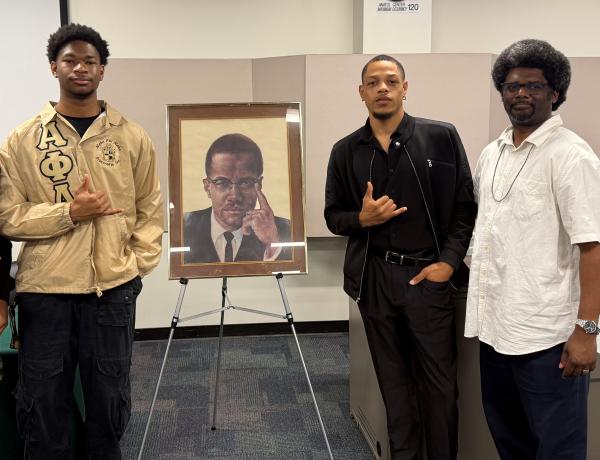Honoring Haji Malcolm X: A 60th Anniversary Commemoration

On Friday, February 21st, the CSULB community gathered to commemorate the 60th anniversary of Haji Malcolm X’s assassination and martyrdom, celebrating his immense contribution to the struggle for Black liberation. The event was organized by the Africana Studies Student Association (ASSA), with support from Dr. Maulana Karenga, the Black Faculty and Staff Association, and Dr. M. Keith Claybrook, chair of the Africana Studies department. The commemoration was a collective effort, as the Black Student Union and Alpha Phi Alpha Fraternity Incorporated also participated in as volunteers, ensuring a united tribute to in honor Malcolm X’s legacy.
Malcolm X, born Malcolm Little on May 19, 1925, in Omaha, Nebraska, was a central figure in the fight for African American civil rights. His early life was marked by tragedy, including the murder of his father and the institutionalization of his mother. In his youth, he became involved in crime, which led to his imprisonment in 1946. During his time in prison, he converted to Islam and joined the Nation of Islam (NOI), adopting the name Malcolm X as a symbol of his lost African heritage.
After his release, Malcolm X became a powerful spokesperson for the Nation of Islam, promoting Black self-sufficiency, racial pride, and a rejection of integration with white society. His dynamic rhetoric made him both influential and controversial, particularly his stance on racial separation and his critiques of Martin Luther King, Jr.’s nonviolent approach.
In 1964, after internal conflicts within the NOI, Malcolm X left the organization and traveled to Mecca. This journey profoundly shifted his views, leading him to adopt a more inclusive perspective on civil rights and human rights, advocating for unity across racial lines.
Tragically, on February 21, 1965, Malcolm X was assassinated while giving a speech in New York City. While members of the Nation of Islam were implicated in his death, many still question the full circumstances of his assassination. Despite his untimely death, Malcolm X’s legacy as an advocate for Black empowerment and racial justice endures, continuing to inspire those who fight for equality.
During the commemoration on campus, Darrell White, former president of the Africana Studies Student Association (ASSA), shared how Malcolm X’s life and work influenced his own journey. As a former incarcerated student and first-generation college student, White expressed how Malcolm X’s example encouraged him to break through barriers he once thought impossible. Thanks to Malcolm X, White was able to make significant strides in his education and life, proving that the power of his legacy continues to inspire and uplift those who face adversity.
This event served not only to remember Malcolm X’s contributions but also to reinforce the ongoing importance of his work in the fight for justice and equality.




